
The causes of the Great Depression in the early 20th century in the United States have been extensively discussed by economists and remain a matter of active debate. They are part of the larger debate about economic crises and recessions. The specific economic events that took place during the Great Depression are well established.

Henry Woodfin Grady was an American journalist and orator who helped reintegrate the states of the Confederacy into the Union after the American Civil War. Grady encouraged the industrialization of the South. He was praised by contemporaries and by authors Shavin and Galphin as a civic promoter,political strategist and captivating speaker,and by Atlanta journalist Frederick Allen as a visionary. However,in modern times,Grady's arguments for the need for white supremacy in the post–Civil War South have resulted in his legacy being seen as mixed and overtly racist. Grady's name has been removed from several schools including Atlanta's former Grady High School. Grady was the father-in-law of Federal Reserve Chairman Eugene Robert Black and grandfather of banker and World Bank President Eugene R. Black Sr.

Ivan Earnest Allen Jr.,was an American businessman who served two terms as the 52nd mayor of Atlanta,during the Civil Rights Movement of the 1960s.
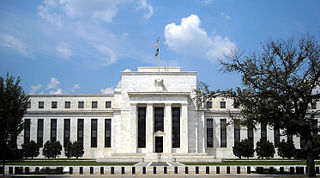
The Federal Reserve System has faced various criticisms since it was authorized in 1913. Nobel laureate economist Milton Friedman and his fellow monetarist Anna Schwartz criticized the Fed's response to the Wall Street Crash of 1929 arguing that it greatly exacerbated the Great Depression. More recent prominent critics include former Congressman Ron Paul.
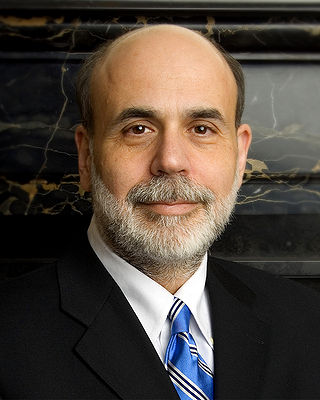
Ben Shalom Bernanke is an American economist who served as the 14th chairman of the Federal Reserve from 2006 to 2014. After leaving the Fed,he was appointed a distinguished fellow at the Brookings Institution. During his tenure as chairman,Bernanke oversaw the Federal Reserve's response to the late-2000s financial crisis,for which he was named the 2009 Time Person of the Year. Before becoming Federal Reserve chairman,Bernanke was a tenured professor at Princeton University and chaired the department of economics there from 1996 to September 2002,when he went on public service leave. Bernanke was awarded the 2022 Nobel Memorial Prize in Economic Sciences,jointly with Douglas Diamond and Philip H. Dybvig,"for research on banks and financial crises",more specifically for his analysis of the Great Depression.

The Phi Kappa Literary Society is a college literary society,located at the University of Georgia in Athens,Georgia,and is one of the few active literary societies left in America. Since their refounding in 1991,the society continues to meet every academic Thursday of the fall and spring semesters at 7 pm at Phi Kappa Hall on the University of Georgia's North Campus. The Phi Kappa Literary Society holds formal debates and a forum for creative writings and orations as well as poetry.
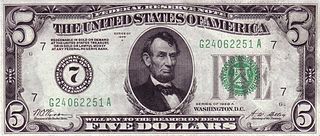
The Series of 1928 was the first issue of small-size currency printed and released by the U.S. government. These notes,first released to the public on July 10,1929,were the first standardized notes in terms of design and characteristics,featuring similar portraits and other facets. These notes were also the first to measure 6.313" by 2.688",smaller than the large-sized predecessors of Series 1923 and earlier that measured 7.438" by 3.141".

Eurith Dickinson Rivers,commonly known as E. D. Rivers and informally as "Ed" Rivers,was an American politician from Lanier County,Georgia. A Democrat,he was the 68th Governor of Georgia,serving from 1937 to 1941.
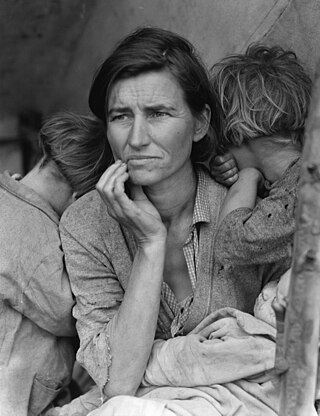
In the United States,the Great Depression began with the Wall Street Crash of October 1929 and then spread worldwide. The nadir came in 1931–1933,and recovery came in 1940. The stock market crash marked the beginning of a decade of high unemployment,poverty,low profits,deflation,plunging farm incomes,and lost opportunities for economic growth as well as for personal advancement. Altogether,there was a general loss of confidence in the economic future.
Robert Benham is a retired American lawyer and jurist who served on the Supreme Court of Georgia for over 30 years,retiring in March 2020. He was the second African-American graduate of the University of Georgia School of Law,the first African-American to serve on the Supreme Court of Georgia,and the first African-American to serve as the court's chief justice.

Nathaniel Edwin Harris was an American lawyer and politician,and the 61st Governor of Georgia.

Louis Thomas McFadden was a Republican member of the United States House of Representatives from Pennsylvania,serving from 1915 to 1935. A banker by trade,he was the chief sponsor of the 1927 McFadden Act,which rechartered the Federal Reserve System in perpetuity,liberalized branch banking for national banks and increased competition between member and non-member banks. He is known for his antisemitic conspiracy theories,which eventually saw him lose his seat in the House of Representatives.

Richard Brevard Russell Sr. was an American lawyer,legislator,jurist,and candidate for political office. He is the patriarch of the Russell Family of Georgia,a notable 20th century Georgia political family.

Eugene Robert Black Sr. was an American banker who was president of the World Bank Group from 1949 to 1962.
Eugene Black may refer to:
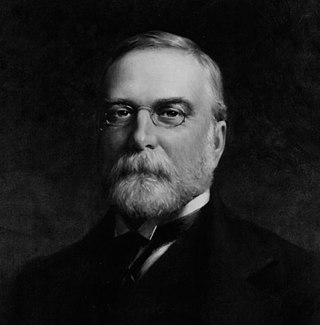
Robert Winthrop was a wealthy banker and capitalist in New York City.
Frank Arthur Hooper was a United States district judge of the United States District Court for the Northern District of Georgia.
Maximilian Bethune Wellborn was the first chairman of the board and a governor of the Federal Reserve Bank of Atlanta. He also served as a county commissioner and state senator from Calhoun County,Alabama. Wellborn was a banker and also involved in the railroad,real estate and insurance businesses.
The Atlanta Law School was a private,night law school for working professionals and others seeking a legal education. The school's faculty members were practicing lawyers and judges from across the state of Georgia.















